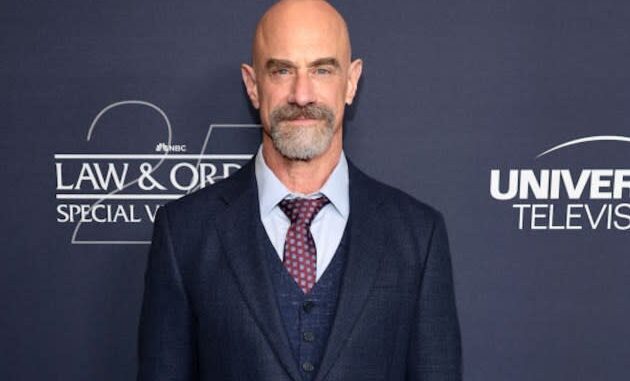
The year 2011 dawned like any other for fans of Law & Order: Special Victims Unit, a procedural bedrock that had etched itself into the very DNA of television. Twelve seasons deep, the show was more than a series; it was an institution, powered by the visceral, often volatile, partnership between Detective Olivia Benson and Detective Elliot Stabler. Then, with the jarring abruptness of a gavel strike, the world of SVU was irrevocably altered. Christopher Meloni, the formidable actor behind Elliot Stabler, departed, leaving behind a void that resonated for a decade. This wasn’t just an actor leaving a show; it was a “departure drama” born from contract talks that fell through, a moment that would later be illuminated by Meloni’s candid reflections, revealing the cold calculus of Hollywood juxtaposed with the enduring power of a character.
For twelve years, Christopher Meloni embodied Elliot Stabler with a raw intensity that was both unsettling and magnetic. Stabler was the show’s volatile heart, a detective whose passion often blurred the lines of procedure, whose personal traumas frequently bled into his professional life, and whose unflinching loyalty to his partner, Olivia Benson, formed the unshakeable bedrock of the series. Their partnership, often dubbed “Bensler” by a devoted fandom, transcended typical television pairings; it was a masterclass in unspoken understanding, shared trauma, and unwavering support. When the news broke in the spring of 2011 that Meloni would not be returning for Season 13, a collective gasp rippled through the fandom, followed by disbelief and, eventually, a profound sense of loss. How could SVU exist without one half of its central, pulsating core?
The drama, as Meloni would later “open up” about, was less about animosity and more about the dispassionate machinery of the television industry. Contract negotiations are a delicate dance between an actor’s perceived value and a studio’s financial ceiling. As Season 12 concluded, Meloni, a pivotal figure in a highly successful franchise, sought terms that included a shorter shooting schedule and a salary commensurate with his star power and the show’s longevity. Universal Television, the studio behind SVU, held its ground. The precise details remain shrouded in the specifics of private negotiations, but the essence was clear: an impasse was reached. The two sides simply could not meet in the middle. “It just didn’t work out,” Meloni would later state with a characteristic shrug, emphasizing that there was no “bad blood,” simply a business decision that couldn’t reconcile.
The on-screen handling of Stabler’s exit only amplified the drama and the fans’ heartbreak. After a Season 12 finale that saw Stabler involved in a police shooting, his departure in the Season 13 premiere was dealt with in an almost perfunctory phone call, a narrative convenience that felt painfully inadequate for a character of his magnitude. It was a stark reminder of the often-unromantic realities of television production, where story arcs can be abruptly truncated by off-screen business decisions. The ghost of Elliot Stabler lingered for years, a gnawing absence that Benson, and the show itself, grappled with, adapting and evolving in his wake.
However, time and distance often bring clarity and perspective. As the years passed, Meloni, freed from the strictures of a long-running procedural, explored a diverse range of roles, flexing different creative muscles. When he began to “open up” about his departure in subsequent interviews, often with his beloved former co-star Mariska Hargitay, it was always with a calm, almost philosophical detachment. He harbored no bitterness. He spoke of the decision as a professional turning point, a moment to “take a breath” and choose a different path. He consistently affirmed his love for his former castmates, particularly Hargitay, whose bond remained unbroken by the contractual disagreements. His candor demystified the “drama,” revealing it not as a personal feud, but as a crossroads where two viable paths simply diverged.
The ultimate testament to this understanding, and the enduring power of the character, came a decade later. Meloni’s return to the Law & Order universe in 2021, heading his own spin-off, Organized Crime, and frequently crossing over with SVU, transformed the original departure drama into a triumphant narrative arc. The contract talks that fell through in 2011, once a source of fan despair, ultimately paved the way for a richer, more evolved return. Stabler, a decade older, wiser, and scarred by new tragedies, was resurrected not merely as a guest star, but as the protagonist of his own story, allowing Meloni to inhabit the character with renewed depth and dimension.
The “departure drama” of 2011 SVU was a poignant lesson in the intricate dance between art and commerce. Christopher Meloni’s exit, born from contract talks that simply “fell through,” left an immediate wound, a gaping hole in the fabric of a beloved show. Yet, his eventual reflections – “Meloni opens up” – transformed the narrative from one of loss to one of professional discernment and, ultimately, unexpected reunion. It underscores that sometimes, an ending is merely a pause, and that even the most painful goodbyes in the unforgiving landscape of television can, with time and the right alignment of stars, lead to a truly spectacular hello.
